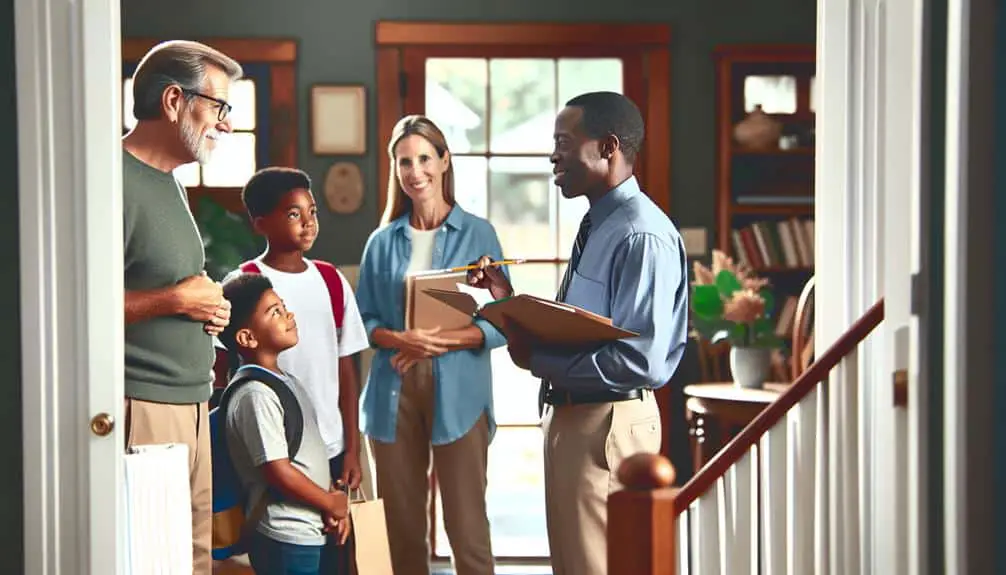State laws mandate requirements for homeschooling home visits, ensuring educational standards are met. Visitors, often education professionals, confirm compliance and academic progress. Parents retain rights to choose curriculum and teaching methods, providing personalized education. Refusing visits may result in legal consequences, impacting homeschooling status. Understanding the balance between oversight and privacy in these regulations is crucial.
Key Points
- State regulations dictate frequency and purpose of homeschooling home visits.
- Home visits ensure compliance with educational standards and academic progress.
- Educational authorities or designated officials conduct home visits.
- Parents have the right to choose curriculum and methods of instruction.
- Refusal of home visits may lead to legal consequences and permit revocation.
State Requirements for Home Visits
When homeschooling in the United States, it's important to be aware of the specific state requirements for home visits. Each state has its own regulations regarding home visits for homeschooled students. These regulations aim to guarantee that the education being provided meets the required standards and that the students are receiving a proper education.
Privacy concerns play a significant role in these state requirements for home visits. States must balance the need to verify the quality of education being provided with respecting the privacy of homeschooling families. Therefore, many states have strict guidelines in place to protect the privacy of families during home visits. It's essential for homeschooling families to understand these privacy concerns and their rights in order to navigate the home visit process successfully.
Accountability measures are another key aspect of state requirements for home visits. States use these visits to hold homeschooling parents accountable for the education being provided to their children. By conducting home visits, states can confirm that homeschooled students are meeting the educational standards set forth by the state. Understanding these accountability measures is vital for homeschooling families to comply with state regulations and provide a quality education for their children.
Frequency of Home Visits
The frequency of home visits for homeschooled students is determined by state regulations and typically varies depending on the state's requirements and standards. Home visit frequency can range from annual visits to more frequent checks throughout the academic year. Some states may require quarterly visits to verify compliance with educational standards and to assess the overall well-being of the homeschooled student. These visits are vital to confirm that the educational curriculum meets state guidelines and that the child is making satisfactory academic progress.
Privacy concerns are often raised regarding the frequency of home visits. Families may feel that frequent visits intrude on their privacy and disrupt the homeschooling environment. Balancing the need for oversight with respect for the family's privacy is pivotal in establishing a supportive relationship between homeschooling families and state authorities. State regulations often aim to strike a balance between ensuring educational quality and respecting the privacy rights of homeschooling families.
Who Conducts Home Visits?
Educational authorities or designated officials typically conduct home visits to homeschooled students for compliance verification and evaluation purposes. These home visitors are individuals authorized by the state or local educational agencies to make sure that homeschooled students are meeting the required educational standards. Home visits serve multiple purposes, including confirming that the homeschooling environment is conducive to learning, verifying the curriculum being used aligns with state regulations, and evaluating the academic progress of the students.
The home visitors who conduct these visits are often education professionals with experience in curriculum evaluation and educational appraisal. They're tasked with evaluating the educational setting, reviewing the curriculum materials, and discussing the educational progress of the homeschooled student with their parents or guardians. The purpose of these visits is to make certain that homeschooled students are receiving a quality education that meets the state's requirements. Home visitors play a significant role in upholding the standards of homeschooling and promoting the academic welfare of homeschooled students.
Rights of Homeschooling Parents
Homeschooling parents possess specific rights that safeguard their autonomy in overseeing their children's education, ensuring compliance with legal requirements, and maintaining educational standards. Parental rights in homeschooling typically include the freedom to choose the curriculum that aligns with their educational philosophy, religious beliefs, or the specific needs of their child. Additionally, parents have the right to tailor the pace and method of instruction to suit the individual learning style of their child.
Home education regulations vary by state and may include requirements such as maintaining attendance records, submitting educational plans, or ensuring that certain subjects are covered. Despite these regulations, homeschooling parents still retain significant control over how they deliver education to their children. This autonomy allows parents to adapt teaching methods to suit their child's unique strengths and weaknesses, providing a personalized learning experience that may not be achievable in a traditional school setting.
Consequences of Refusing Home Visits
If a homeschooling parent refuses home visits, they may face legal repercussions that could impact their ability to continue educating their child autonomously. When a parent opts for homeschooling, they agree to comply with certain regulations, including allowing home visits by authorized personnel. By refusing these visits, the parent may be in violation of homeschooling laws, leading to potential legal implications.
Parental rights in homeschooling aren't absolute and must be balanced with the state's interest in ensuring the well-being and educational progress of the child. Refusing home visits can raise concerns about the quality of education being provided, the child's safety, and compliance with curriculum standards. In such cases, authorities may intervene to investigate the situation further.
Legal implications of refusing home visits may include warnings, fines, or even the revocation of the homeschooling permit. It's essential for homeschooling parents to understand the requirements set forth by their state regarding home visits to avoid jeopardizing their ability to educate their child at home within the bounds of the law.




